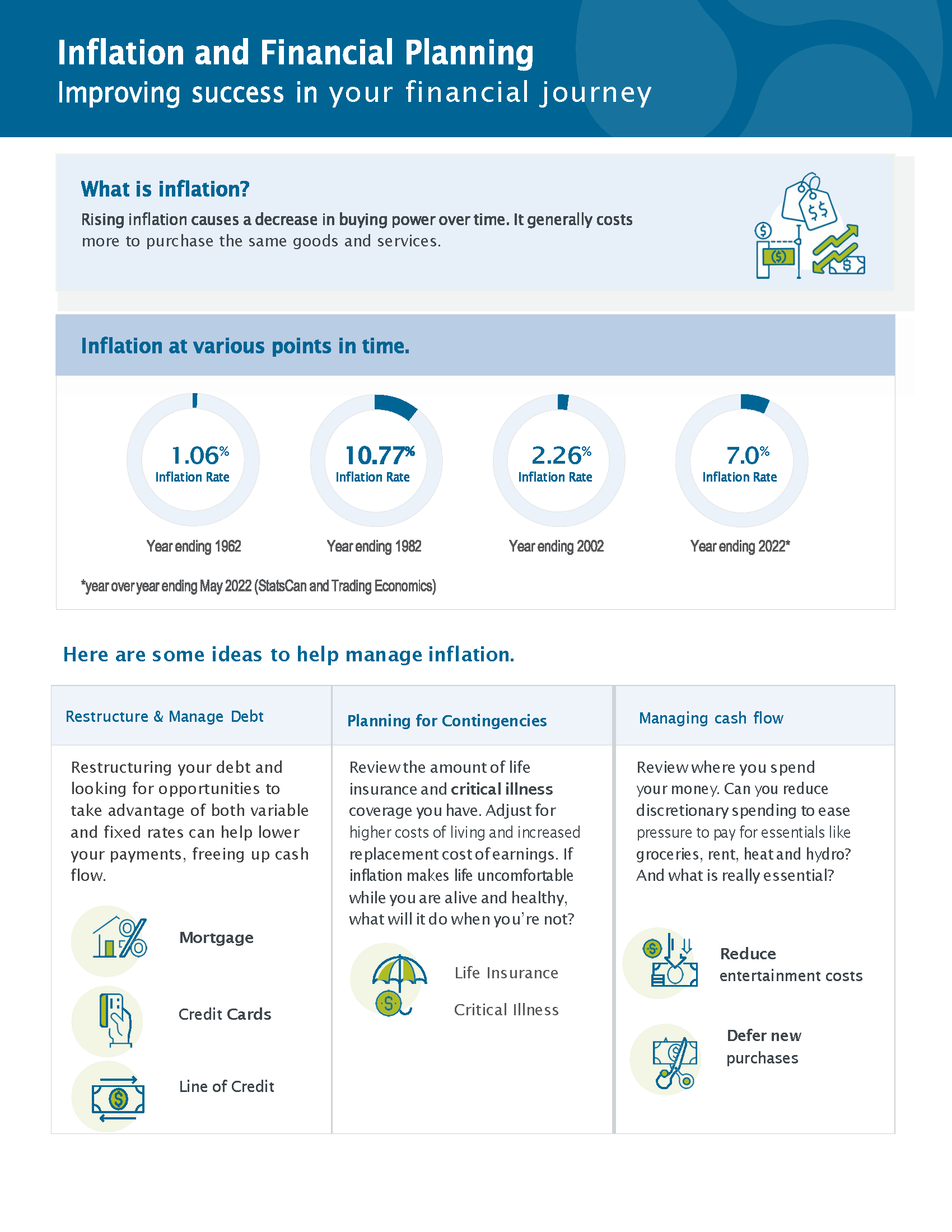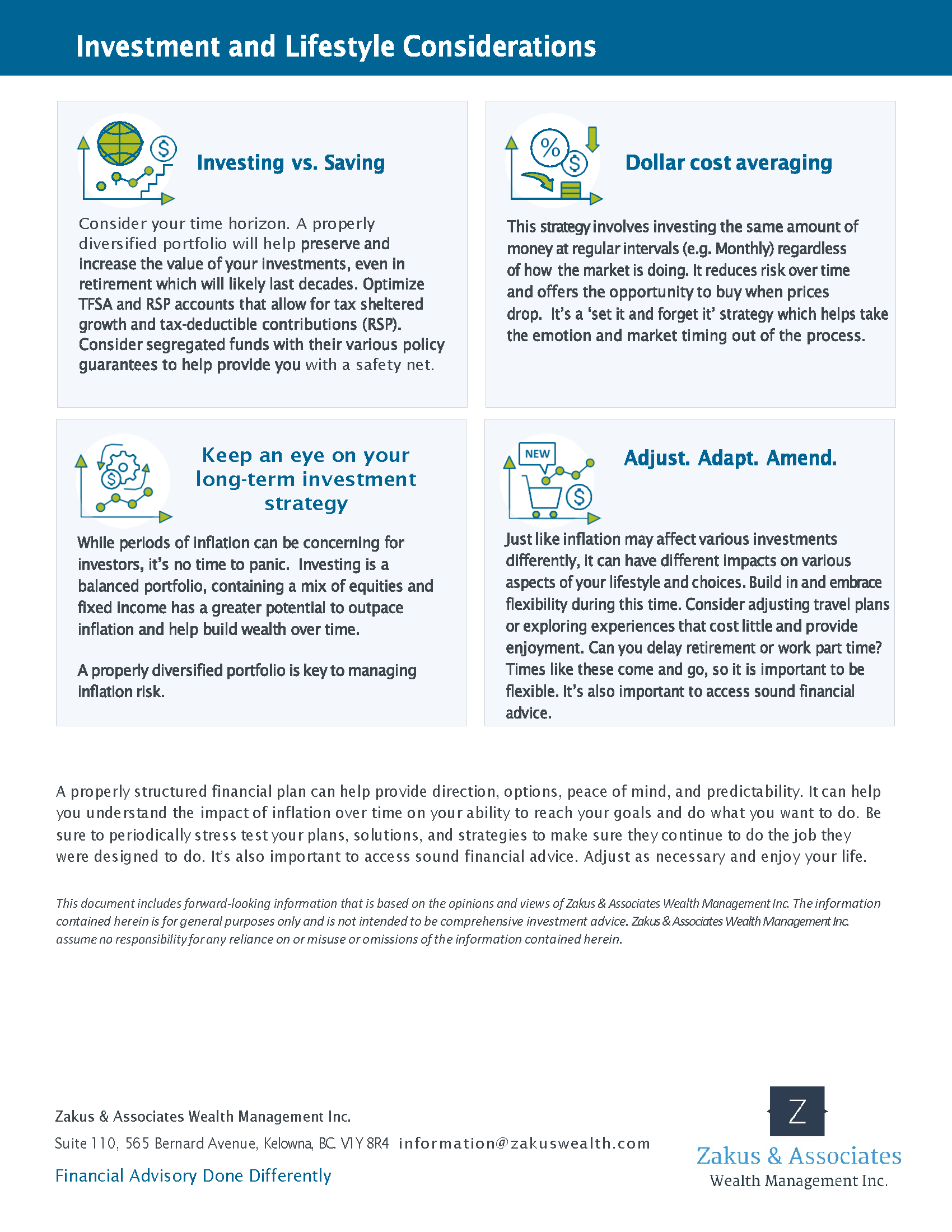Archive for year: 2022
The Basic Truths About Investing
/in Financial Planning, Frontpage Article /by adminThe first few months of 2022 have been tough for investors. Here’s a refresher on the best ways to weather uncertainty.
I have been through a number of periods like this in my career and am often asked by clients what they should be doing in response. There are 10 basic truths of investing that I have learned in my time as a Professional Financial Advisor. These touch on the importance of diversification, maintaining a long-term perspective and that time in the market is more important than timing the market.
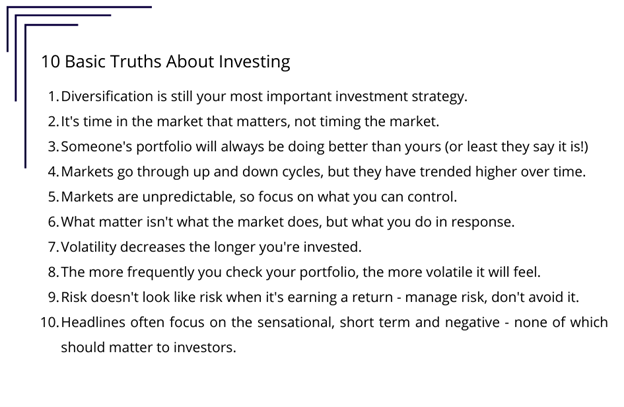
1. Diversification is still your most important investment strategy.
This one was and still is at the top of my list, and one that you would have heard me discuss in past commentaries. If recent history has shown us anything, it’s that diversification remains one of the best ways to manage volatility in your portfolio. Different asset classes and markets go up and down at different times, so combining them into a well-diversified portfolio will smooth out investment returns over time. This can help you manage through volatile markets like the one we have experienced so far in 2022. It will also help you stick to your long-term investment plan.
2. It’s time in the market that matters, not timing the market.
One thing I have learned is that it is extremely difficult to successfully time the market. It involves making two decisions – when to get out and when to get back in. Even if you manage to find the right time to get out of the market, it’s highly unlikely that you’ll be able to get back in at the right time. As difficult as the market drawdown was in March 2020, sitting on the sidelines meant you likely missed out on some pretty impressive gains that followed shortly after the low. Missing even a few of the strongest days in the market can have a significant impact on your overall investment returns.
3. Someone’s portfolio will always be doing better than yours (or at least they will say it is!).
People will always tell stories of a hot stock or investment tip that made them money. Meme stocks, bitcoin and NFTs all come to mind. But no discussion of investment returns, or performance is meaningful without also considering the level of risk involved. To earn higher returns, you need to accept more risk or volatility. So those who are bragging about their investing success could have a very different risk tolerance or time horizon than you, or they may simply be exaggerating their results. Either way, you should not take this as an indication that your investment portfolio is inferior or that you are missing out on something.
4. Markets go through up and down cycles, but they have trended higher over the long term.
Markets do not simply go up in a straight line. They experience many ups and downs, driven by a host of different factors. Some of these are fairly small and are resolved quickly; others are larger and can take longer for markets to digest. What is important to remember is that downturns have happened before, and will happen again, but they are not a reason to panic. In the past, markets have always recovered and trended higher over the long term.
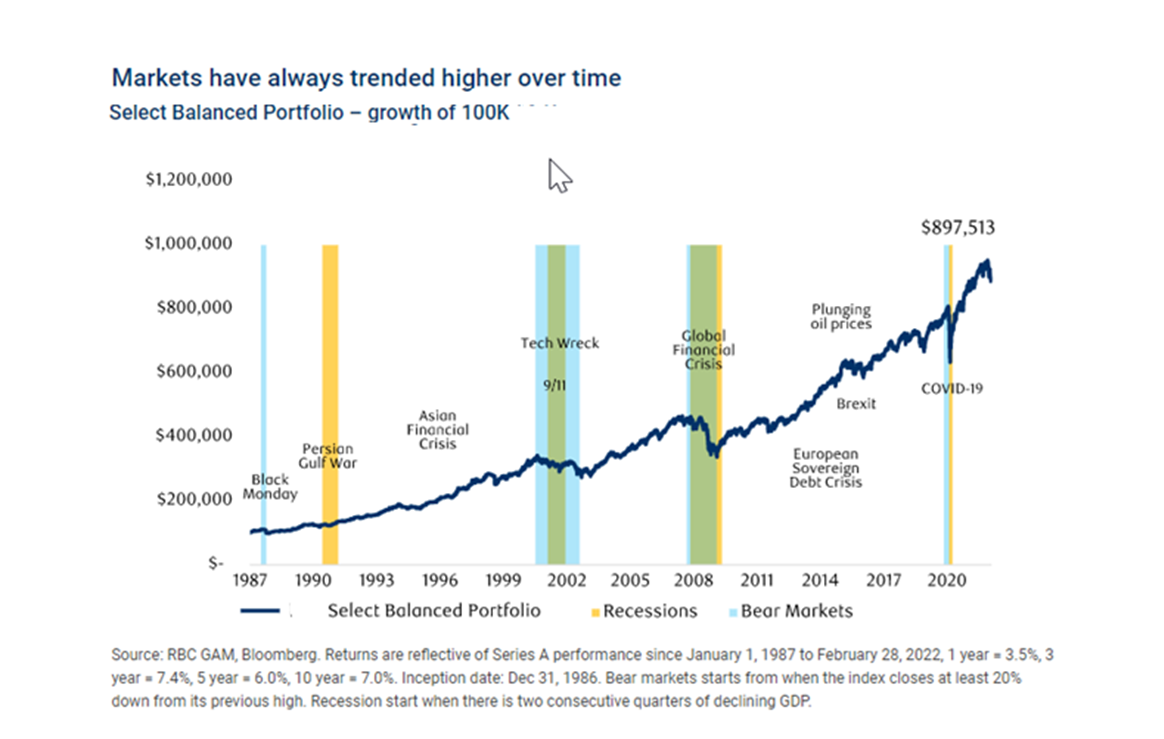
5. Markets are unpredictable, so focus on what you can control.
Market downturns can be painful, especially when they follow a period of strong gains and relatively low volatility like we saw in 2021. But you have no influence over what the market is doing, so in periods like these it’s important to focus on what you can control. This includes keeping your emotions in check, staying invested and focusing on your financial goals. Over the long term, investing success has less to do with the ups and downs of markets and more to do with how you react to that volatility.
| What You Can’t Control | WHAT YOU CAN CONTROL |
| The Stock Market | YOUR PERSONAL FINANCIAL GOALS |
| Inflation | YOUR RISK TOLERANCE |
| Geopolitical Events | YOUR TIME HORIZON |
| Interest Rates | HOW MUCH YOU SAVE & INVEST |
| What people say on social media | YOUR EMOTIONS – SOMETIMES |
6. What matters isn’t what the market does, but what you do in response.
This one is an extension of #5, but it’s worth reinforcing. Being aware of how your emotions can impact your investment decisions during volatile periods, can help you avoid making poorly timed changes to your portfolio (see #2). This is easier said than done, even for professional investors. Ignoring the short-term noise in markets is key. So is sticking to the solid financial plan that you put together with your advisor. It’s what you do – or rather what you don’t do – during these volatile times that can make all the difference.
7. Volatility decreases the longer you’re invested.
All investments carry some degree of risk. If you want to earn a higher return on your investment, you have to be willing to accept more risk or volatility. If your tolerance for risk is low, then you will have to give up some return to achieve that. Understanding this relationship is a fundamental part of investing. That said, the volatility that comes from taking on more risk in your portfolio tends to decrease over time… especially if you are invested in a well-diversified portfolio (see #1).
8. The more frequently you check your portfolio, the more volatile it will feel.
It has never been easier to get up-to-date information on the status of your portfolio. But you must also remember that the more often you check it, the more volatile it will feel. That is because on a day-to-day basis, there is a 50-50 chance that it will have a positive or negative return. So, watching your portfolio every day can lead you to think your investments are riskier than they really are. Instead, stay focused on your long-term investing goals and review your portfolio less frequently. This approach can help as the likelihood of seeing a positive return increases over time. It reminds me of an old TV ad: “Just set it and forget it”!
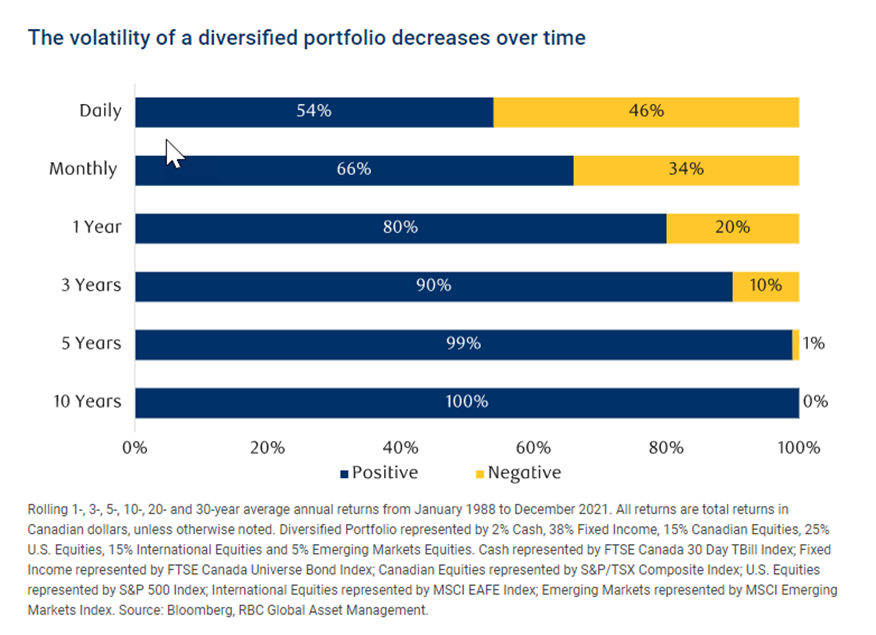
9. Risk doesn’t look like risk when it’s earning a return — manage risk, don’t avoid it.
It’s easy to say that you are comfortable with a higher level of risk when the markets are going up. But some people quickly abandon that sentiment when markets are volatile. That’s because the fear of loss can far outweigh the anticipation of gains. Markets are unpredictable, we can’t change that fact. But you can manage the risk by diversifying your portfolio (see #1 again) and by focusing on what you can control (see #5).
10. Headlines often focus on the sensational, short term and negative — none of which should matter to investors.
There are always a variety of economic, financial, or political events that can give you a reason to not invest. This year is no different. But headlines are designed to grab your attention and shouldn’t be cause for alarm or a reason to make sudden changes to your portfolio. Looking beyond the headlines and keeping the previous nine points in mind can provide you with a solid foundation for navigating markets in good times and in bad. In the end, staying on track and achieving your financial goals should be the only thing that matters.
This article is intended as general information only and is not to be relied upon as constituting legal, financial, or other professional advice. Information presented is believed to be factual and up to date, but we do not guarantee its accuracy and it should not be regarded as a complete analysis of the subjects discussed. All expressions of opinion reflect the judgment of the authors as of the date of publication and are subject to change
There isn’t much you can do about the economy — keep focused on your Personal Financial Goals
/in Financial Planning, Frontpage Article /by adminLately, I have had so many people ask me if we are heading into a recession. This seems to be the big question that is weighing heavily on the minds of some.
Last week, I was speaking with one person, who seemed to be thinking that this could perhaps be Financial Armageddon, and I asked, “Do you know what a recession is?”
She replied, “Not Really”. That’s why I am asking you.” Okay Fair point.
While some media headlines have suggested we are already are in a recession, lets take a look at what a recession is from a definition.
“A recession is a temporary period of time when the overall economy declines; it is an expected part of the business cycle. This period usually includes declines in industrial and agricultural production, trade, incomes, stock markets, consumer spending, and levels of employment. In purely technical terms, a recession occurs when two or more successive quarters (six months) show a drop in real gross domestic product (GDP), i.e., the measure of total economic output in the economy after accounting for inflation. In this sense, recessions are broad and can be particularly painful and challenging times for a country.”
A recession is simply when the economy slows down for at least six months. That’s it.
In Canada, recessions can also occur regionally because each province has exposure to different industries that are affected by different variables. A recession can occur in Alberta, for example, if the oil and gas markets decline, but not occur at the same time in Ontario if manufacturing and services remain steady, or vice versa.
Recessions do not occur very often because expansion usually occurs in the economy. Canada has experienced a total of five recessions since 1970 and twelve since 1929. Historically recessions have lasted between three to nine months; the most recent, the 2008–09 Global Financial Crisis, also referred to as the ‘The Great Recession’.
Here is an analogy. You are driving 50 km/h and you come across a school zone. You slow down to 30 km/h, then the school zone ends, and you resume driving 50 km/h.
Think of the car you are driving as the economy. You are humming along, then you slow down, then you resume your speed. Not really that scary, is it? During a recession, the economy continues to grow, just at a slower speed. Similar to the car analogy, you continue to drive through the school zone, just at a slower speed.
Recessions will occur over time, but they are not the financial Armageddon like the media portrays. The reality is you might experience a dozen or more in your lifetime.
Now, please don’t get me wrong. I am not saying that they are fun, and I am not saying that some people won’t lose their jobs, or that some businesses won’t go bankrupt in a recession. Most definitely, some people will lose their jobs, and some business will go bankrupt. Unfortunately, bad things happen.
Keeping things in perspective, bad things do not just happen during a recession. Let’s agree that economic casualties are bad irrespective of where we are in the economic cycle, and just focus on the concept of a recession for now.
So, if recessions happen as part of the economic cycle, and they are relatively short lived, what is all the fuss about? We know there will be some contraction in the economy but to be blunt, the 24/7 media machine needs to talk about something, don’t they?
Do you remember the Greek sovereign debt crisis? No? Well, not many people do. But did you know it lasted from early 2009 to late 2010. For six months in 2009, Greek debt was the big story that everyone was focused on until the next crisis of the day came along.
Now, an economic slowdown is a little more complicated than just the fear of what might happen.
Right now, we are dealing with the worst inflation seen in 40 years. Setting aside the crisis in the Ukraine, the surge in inflation we have seen since last spring largely reflects pandemic-related shifts in global supply and demand.
Looking specifically at Canada, we have three key elements that are driving inflation. The first is the global shift toward goods and away from services, combined with pandemic-related disruptions to supply chains. The second is a broadening of price increases to everyday items like food and energy, making it more difficult for consumers to avoid paying higher prices. And the third is the strength of the Canadian recovery and the overall balance between demand and supply in our economy.
The Bank of Canada has an inflation target of 2%. One of the tools it has is to raise interest rates which started in March of this year. The primary reason the Bank of Canada raises interest rates is to cause a slowdown in economic growth. Interest rates determine how much it costs for consumers and businesses to borrow. When rates increase, borrowing typically decreases. The Bank of Canada hopes that by raising interest rates, consumers reduce spending and businesses delay new investments, which will help lower demand and temper prices.
We need to remember that measuring the economy is not instantaneous. It takes time for these measures to work through the system which is why we hear some economists say we are already in a recession. And since recessions might be as short as three months, a recession could be over before the official numbers come out.
So, what are you going to do about all this? Well, unless you run a central bank or a multi-national corporation, there isn’t much you can do about the economy. But what you can do stay focused on your personal financial goals. Tune out all the white noise and remember the 10 Truths About Investing.
- Diversification is your most important strategy.
- It’s time in the market that matters, not timing the market.
- Someone’s portfolio will always be doing better than yours – or at least they say it is.
- Markets go through up and down cycles, but the have trended higher over time.
- Markets are unpredictable, so focus on what you can control.
- What matters isn’t what the market does, but what you do in response.
- Volatility decreases the longer you are invested.
- The more frequently you check your portfolio, the more volatile it will feel.
- Risk doesn’t look like risk when it’s earning a return – manage risk don’t avoid it.
- Headlines often focus on the sensational, short term and negative – none of which should matter to investors.
Stay well, stay safe and stay focused on your financial goals!

Footnotes:
https://www.bankofcanada.ca/2022/03/getting-inflation-back-to-target/
https://www.bankofcanada.ca/2022/03/economic-progress-report-controlling-inflation/
https://www.thecanadianencyclopedia.ca/en/article/recession
This article is intended as general information only and is not to be relied upon as constituting legal, financial, or other professional advice. Information presented is believed to be factual and up to date, but we do not guarantee its accuracy and it should not be regarded as a complete analysis of the subjects discussed. All expressions of opinion reflect the judgment of the authors as of the date of publication and are subject to change
Zakus & Associates Wealth Management Inc.
At Zakus & Associates Wealth Management Inc., our mission is to build trusted, long-term relationships with our client by providing innovative financial strategies and solutions so you can live life on your terms.
Reach Out Today!
Phone: 778-215-7230
Email: [email protected]
Suite 110, 565 Bernard Ave
Kelowna BC V1Y 8R4


